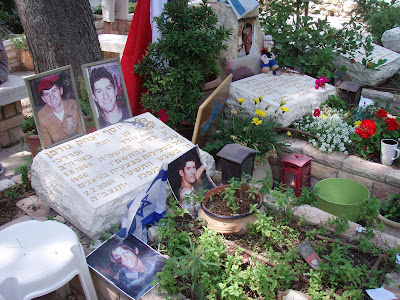For many people on my Birthright tour, the Western Wall was the most emotional part of the journey. However, I found myself swayed by emotion not at the Western Wall, but at Har Herzl in Jerusalem where Israel's fallen soldiers are buried.
In the United States gravesites are usually unadorned. A person's headstone is often just a name, a date, and maybe a sentence or two in loving commemoration. It is easy to remember a person without truly feeling that person's loss, but at Har Herzl the gravesites themselves are alive, and it is impossible not to connect with such a strong presence of humanity. The graves are like little flowerbeds lined with stones and bursting with flowers. Family members and friends place pictures of their loved ones on the graves. Nestled between bunches of flowers are little treasures that define and identify the people to whom they belonged. On one of the graves sat a mug, conjuring the painfully simple image of that fallen soldier--still alive--sitting around every morning enjoying his daily cup of coffee. Little chairs and stools were also dotted in between the graves, marking the spot where the soldier's mother, father, sister, brother, or friend would sit in mourning or even joyous remembrance, visiting the body of their loved one who had passed. The details everywhere were overwhelming.

In addition to seeing such lively graves, our tour guides shared stories of the remarkable individuals who had lost their lives in service. When our Israeli tour guide welled up with tears as she stood next to the grave of one of her own soldiers, the entire group joined her in mourning. It was at this moment when I knew that no one on our group felt foreign. Zionist or not, religious or not, no one could turn their back on this kind of collective remembrance of the past and hope for future peace.




Comments
Post a Comment